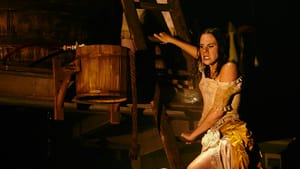Stay in the Loop
BSR publishes on a weekly schedule, with an email newsletter every Wednesday and Thursday morning. There’s no paywall, and subscribing is always free.
So vast is art, so narrow human wit
What art critics really do—at home and abroad

One of the first things you notice when you’re a US theater critic among an international cadre of theater critics is that other countries go about theater and criticism differently. That is, other countries lend significant financial support to both endeavors. Also, in some of those countries, a critic’s too-free speech might just endanger their own freedom.
The last time I joined the International Association of Theatre Critics (IATC) in France was about five years ago, on a tour of the Normandy region. There, I badgered one director (a delightful Jean Lambert-wild) so relentlessly about his fundraising methods that he actually seemed to pity my incomprehension. “What can I tell you? Here in France, I guess we’re lucky.”
The government pays for it all—theater, French artists, international artists, festivals. People buy tickets and donate, but extra income is found money, a mere supplement to state funding. The country’s national theaters are just that: a network of houses where artists can tour, experiment, and live on fair wages. Le sigh.
Like the Fringe?
This year, IATC met in Montpellier, a student-filled medieval town just 10 kilometers from the Mediterranean Sea, at the Printemps des Comediéns, a monthlong theater festival filled with compelling solo performances, an excellent French interpretation of Don DeLillo, German auteur Frank Castorf’s naked actors deconstructing Molière, works in progress, and more. When I told my colleagues it was “like our Fringe Festival,” I was roundly rebuked.
“No,” they laughed (again, pityingly), “this is just what European theater is like. It’s part of the national theater system, you know.”
Threats here
Among us were critics from economies established and emerging, governments democratic and totalitarian, and those critics experienced varying degrees of liberty. Of course, the longer we were together, the more stories emerged. Here, I add a disclaimer: I have changed all names and identifying characteristics of the critics and their representative nations and adjusted details of the incidents, because once we started commiserating about our professional challenges (dearth of paying outlets for criticism, anyone?), it quickly became clear we were discussing very different threats to our well-being.
At dinner one night, someone asked if we’d experienced backlash from the people we covered. I chimed in with several incidents and names I won’t protect here: Jesse Kline’s tirade against me from an opening-night stage at Media Theatre; Bernard Havard’s letter to my editor banning me from the Walnut Street Theatre; Jared Reed’s email to a different editor banning me from Hedgerow Theatre. For sure, some of my colleagues were astonished at the disrespect shown critics on this side of the pond. After all, most critics in other parts of the world come from academia, not journalism, which invites a more publicly rough-and-tumble approach.
Threats abroad
And then the others began talking. One critic, part-timing it at night after a lucrative full-time engineering job, submitted a review as usual. Shortly afterward, a high-level representative at that day job summoned the writer into an office to say that the government was not pleased with the critic’s conclusions and offer the option of retracting the review. The critic refused and still part-times it at night, but the day job is gone.

Another critic submitted a review of a production about body-shaming with an explicit word in its title. A request was received to change the word in the review, thus inadvertently proving the playwright’s point about the shame attached to human bodies. The government, not pleased with the show in the first place, wouldn’t negotiate. The word was changed.
The critic explained, “As with many subjects, I can discuss it, I can teach it, but as soon as it’s in writing I will get in trouble. And it won’t just be me. It will be my superior, our families. Sometimes I fight, but sometimes I just find other ways to make my point.”
Funding the arts—at what cost?
These nations are pouring money into the arts and development of their country’s arts-and-culture critics. But their attempts at control of these mediums result in ironies worthy of Aristophanean satire.
Take, for example, one official solution to a play’s nudity. Rather than allowing the performer to offend the audience with the suggestion of skin, the government insisted on a swimsuit onstage, an artistic depiction of the actor’s genitalia taped to the suit’s crotch as though it were the weirdest game of Pin-the-Tail-on-the-Donkey ever played. Another country hosted a production which I’ll call The Ailing Armadillo. Government leaders were outraged, telling the company, “The armadillo is the symbol of our nation! How can it be sick?” The production’s name was changed to something like The Exultant Warrior (the real replacement title was even more ridiculous).
Some critics must contend with restricted internet access and conduct their research illegally. They are encouraged to take deep dives into specialized subjects, so long as they never say where they attained their knowledge. Others must engage in a careful cat-and-mouse game with each review, using pointed language that will attract the notice of the right people and slip under the radar of the dangerous ones.
Why we rail
That’s how important theater criticism (and, by extension, arts criticism) is outside the United States, why many critics insist our work isn’t a consumer guide, why we rail against the thumbs and the stars. Artists still bravely, slyly, defy their governments (and pay dearly, like Kirill Serebrennikov or Juliano Mer-Khamis), and critics spread the messages of these ephemeral performances.
You see yet another production of King Lear showing up onstage, and theater critics tell you why this play, why this production, why now. While we in this country are still guaranteed the right to criticize our government, President Lear has openly attacked and threatened artistic freedoms (Hamilton or SNL, anyone?).
Perhaps there’s also a bit of Lear in our artistic directors and editors. As Lear’s banished Kent exclaims, “Check this hideous rashness.” My colleagues abroad aren’t a cautionary tale, but rather an inspirational one. When there are no more professional critics left to play the Fool, who will lay their lives and livelihoods on the line to defend and interpret the arts, publicly, in writing, despite hostile forces seeking to censor dissent?
Sign up for our newsletter
All of the week's new articles, all in one place. Sign up for the free weekly BSR newsletters, and don't miss a conversation.

 Wendy Rosenfield
Wendy Rosenfield